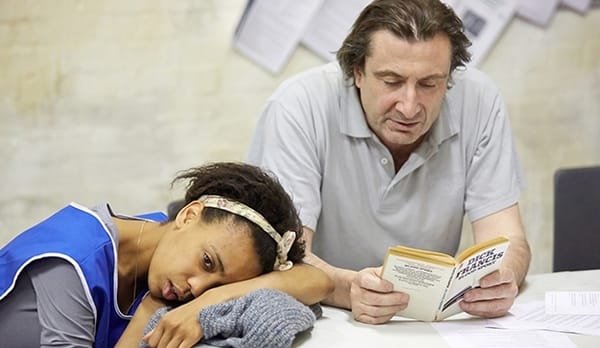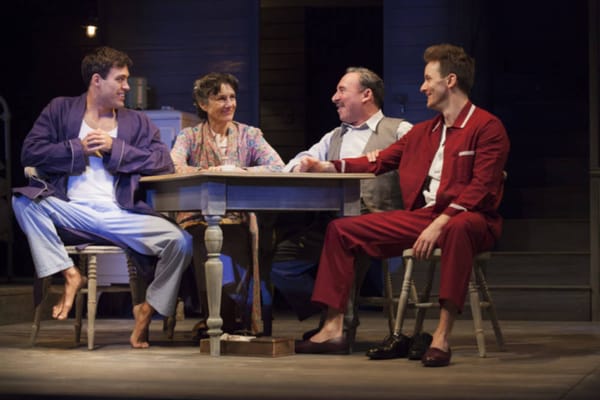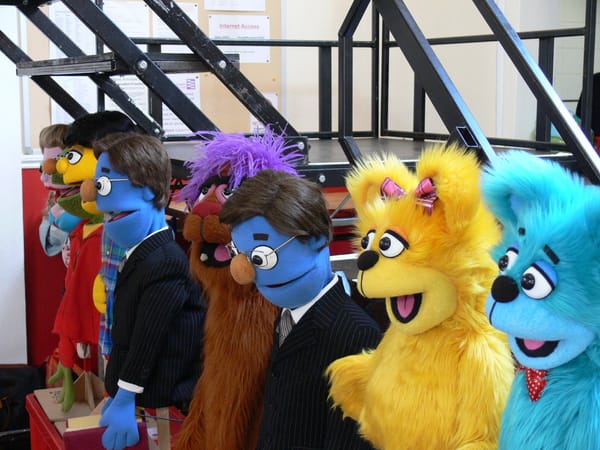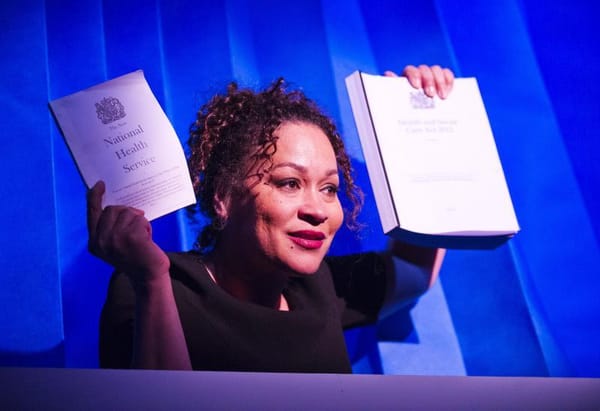In Conversation: Ian MacNeil
Ian MacNeil is the set designer for Everyman, currently on at the National Theatre. Felix Arts’ Jack Steadman caught up with Ian during the run of Everyman for a chat about his work on the show, as well as a look back at his career.
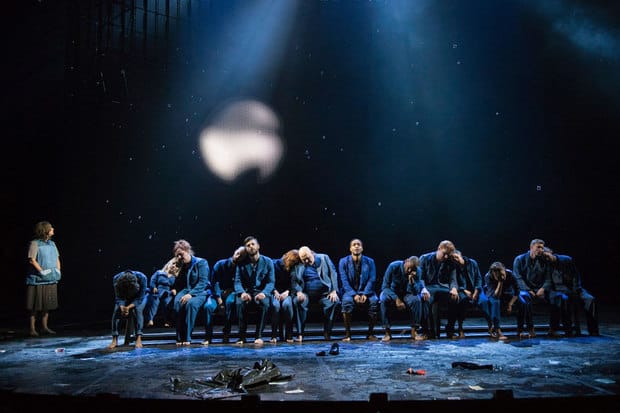
Ian MacNeil is the set designer for Everyman, currently on at the National Theatre. Directed by Rufus Norris, the new Director of the National, and starring Academy Award-winning Chiwetel Ejiofor, the play runs until 30th August. Ian’s previous work includes the likes of Billy Elliot: The Musical, for which he won the Tony Award for Best Scenic Design of a Musical, and the critically acclaimed An Inspector Calls, which won an Olivier Award for Best Set Design.
Felix Arts’ Jack Steadman caught up with Ian during the run of Everyman for a chat about his work on the show, as well as a look back at his career.
Jack Steadman: What was your inspiration for the design of Everyman?
Ian MacNeil: We looked at medieval, allegorical drawings and illuminations. They have what looks like an empty drum, with a sheer side to it, sitting in the earth, and then there’s a hole that’s a pure cylinder. There are figures – people of the world – that are falling into it, but at the same time there are figures that are rising out of it. I guess that’s the most important thing.
The other thing is that Carol Ann [Duffy, who adapted Everyman] is a poet, obviously, so I thought it would be interesting to make it seem as though there were nothing on stage so that you listened to the poetry.
Because it’s set in the present day, we wanted [Everyman] to be a recognisable person. We’d say he was in London, he was wealthy, and he probably worked in Soho. That would explain his friends, and what was it generally feels like. [We wanted] to explain in a subliminal way, not an illustrated way – that was the key thing, to not actually illustrate, but to give the atmosphere, to make it feel like you’re in Soho with beautiful neon light, or street lights, or whatever, in the rain. So it’s subliminal, but that’s what the floor and the LED screen are trying to feel like.
JS: Do you feel the design worked in the end?
IM: Well, one does these things, and one does them as best one can and tries to be clear without words, meaning that audience don’t hear you talk about it, they come and look at it. A design’s a thing that has to speak without words: not speak, convey atmosphere, make you feel things and be an environment that things can take place in. So, successful or not, I feel alright about it.
"A design is a thing that has to speak without words, to convey an atmosphere."
JS: I thought it was fantastic, I really enjoyed seeing it in action. With regards to the process for Everyman – were you involved with Rufus Norris [the director] & Carol Ann from the start?
IM: I’ve known Rufus for a very long time, we’ve done quite a few shows together. It was [originally] a different play, which didn’t get delivered, it missed the deadline, so then he chose to do this. He made the decision, and then we were in a meeting ten days later.
For Carol Ann, he gave her this whole thing to do without a particular set of instructions. She did all of it, and then he met her, which I thought was quite a smart thing to do; she could get a draft out, and then there could be a thing to respond to.
Then there were two weeks of workshop, separated by a month or so, with actors, where ideas were tested.By the first workshop, we had an idea of the design, which was a bit different from how it now is. For the second workshop, I think we had this design. So I sat in the workshops and watched them choreograph, really, and test some text. And that’s quite fun, because you’re all working at the same time. There’s not a lot one can do oneself, but being there, part of the atmosphere, seeing the choreography and the language of it – I can’t say how it helped, but it does, the more you are feeling like you’re all trying to do the same piece, the better. That’s the danger of these things, you’re all trying to do a different piece.
There were quite a few meetings of just me, Rufus and Nicky [Gillibrand], the costume designer. She was at all our meetings. There’re times when only costumes are telling you what’s going on, and scenery is not, and [it] takes a lot of trust on everybody’s part to decide amongst you who has responsibility at any given moment. It’s quite a job, and I really enjoy that bit, because it involves a lot of trust, not just people going off on their own and producing an outcome, but you’re all together. You can decide what you think about it, but how you manifest it, how you make it understandable to an audience is a lot of work. It’s quite vulnerable work, so to have colleagues that you care about and respect and that you can be vulnerable in front of is great.
"It’s quite a job, and it involves a lot of trust... you’re all in it together"
JS: So Everyman was at the National, how does that compare to other theatres, other shows, even other countries that you’ve worked in?
IM: I try and work in theatres that are supportive of the kind of things I just described. I work quite hard to be welcomed in those places, where you don’t have to know everything immediately, you don’t have to bluff and pretend you know all the answers in one hit. Like rehearsals, what might feel right today doesn’t necessarily right tomorrow; it’s kind of evolving – you have to try and work in places where you have the right to change your mind – without driving people mad, obviously! They have deadlines.
So, mostly those are the kind of places I work, and I consider that my job – to find those places and make myself work within them – because that’s the kind of work I want to do. For that reason I’ve pretty much given up on doing opera, because opera needs to have all its information at a certain time which is long before you start rehearsal. I can do it, I have done it, and I’ve had some great times, but essentially what excites me most at the moment is doing new work where you sort of don’t know what it is. You work on it, and then there’s an audience, and the audience sort of tells you what it is and then you have a week to make it better.
"What excites me is doing new work where you sort of don't know what it is"
It’s exciting to be working with your colleagues not knowing, and to have one of those people be the writer sitting alongside you in the spirit of not knowing. At the moment that’s my favourite thing. Carol Ann is very much an open person, and I think she enjoyed being with other people. I imagine that writing can be quite isolated – designing can be quite isolated too – so sharing your problems with your colleagues was delightful.
JS: Definitely. Are you working on anything new at the moment?
IM: I’m in a similar situation, doing Medea [at the Almeida Theatre] – a known, classic text, but it’s been adapted by Rachel Cusk, who is a feminist journalist and writer. It’s a great idea having her do it, because she has written in a very forthright way about the mixed feelings around being cast in the role of a mother – not being cast in the role of a mother by her children, but by the culture. She’s written really well about it, and the way the culture has an opinion on the way a woman might now be perceived now that she is a mother. She’s fascinating on it, and she’s also written about separation and divorce. Her Medea is a really out-there version of it which pulls no punches and is kinda great. It tells you Medea’s situation is not specific to any period of time, it’s going on around you now.
JS: Brilliant. Do you have a favourite show you’ve worked on?
IM: I did a production of An Inspector Calls which is now very famous, it’s over twenty years old and it’s still running. I feel great about that, because it was a particular time where everything came together, in a way that you hope for but is very hard to achieve. So if I was only allowed to point to one show, I’d probably point to that.
JS: Have you had a most challenging show to work on?
IM: I did Billy Elliot, and that’s a big success, but when you’re doing it, it certainly doesn’t feel like that. New musicals, even with an experienced story, which that is, are a hell of a job. I’d not done a musical before, even though I quite liked them, and I was with a lot of people who had also not done a musical before.
New musicals are difficult, they’re extraordinarily difficult, and you’re trying to make a machine that delivers pleasure to an audience. Moment to moment, that’s very, very precarious. The thing that is assured – that you’re trying to create something that gives an audience emotional reassurance – just feels confident as a piece of theatre. That’s an extraordinarily hard thing to do, the components can run away from you so easily. The pitfalls of naff are monumental, the terrain is just loaded with minefields.
"The pitfalls of naff are monumental, the terrain is just loaded with minefields"
It’s a big hit now, and it’s done ten years, and I’m proud of my part in that; but when you’re doing it for nigh-on two years, which we were, it sure as hell doesn’t feel like it. It’s more like a battle. With yourself, with the material, with each other, there’s nothing like it. That would be the most challenging, I think, that I’ve ever done.
JS: It’s a fantastic show, I love it. I’ve got one more question – any recent shows that you’ve seen, that you’ve particularly enjoyed?
IM: I go on and on about A View from the Bridge, Ivo van Hove – did you see it?
JS: Yeah, I managed to catch it just before it closed.
IM: I thought it was magical. You saw things that were not there, it was so confident and every component about it was strong and yet it moment-to-moment felt breathtakingly audacious. So to be strong and audacious all the same time, and sort of not have a set, how great is that? It was thrilling.
JS: It paid off in spades, I think.
IM: It did, but it’s interesting, I think, because those two – that director and that designer – they did Antigone at the Barbican, did you see that? Did you think it worked?
JS: I thought it worked pretty well, I was entranced for a lot of it.
IM: I was very glad I saw it, but it didn’t feel inevitable and assured in the way that A View from the Bridge did. So it made me respect that even more, because I realised how difficult and precarious that was. Whereas when you were watching Antigone you experience the kind of doubt, you just saw how difficult a thing it is to do. They made it look easy on A View from the Bridge. Antigone makes you realise it’s not at all easy, which made me respect them even more.
Ian’s next show, Medea, opens at the Almeida from 25th September. Directed by Rupert Goold and written by Rachel Cusk. Tickets from £10, available online.

